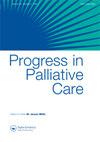新冠肺炎大流行期间无家可归者收容所的志愿者体验
IF 0.8
Q4 PUBLIC, ENVIRONMENTAL & OCCUPATIONAL HEALTH
引用次数: 0
摘要
本文章由计算机程序翻译,如有差异,请以英文原文为准。
Volunteer experiences at a hospice for homeless individuals during the COVID-19 pandemic
Context Volunteers provide important social support for homeless people. While motivations of the volunteer population for homeless people have been studied, little is known about volunteers for a hospice targeting the homeless population. Objectives The purpose of this study is to describe volunteer experiences and motivation at a hospice for homeless people during the COVID-19 pandemic. Methods This study was conducted at a hospice for homeless individuals in Fall 2021. Data were collected by six virtual focus groups in November and December 2021. There were 21 participants. The recordings of the focus groups were automatically transcribed via ZOOM. The data were analyzed based on themes. Results This study has highlighted three main findings. First, honoring a loved one and being engaged in the community were two main reasons individuals began volunteering at the hospice center. Second, volunteers faced many challenges during the COVID-19 pandemic, including a slow start, increased use of technology, and constant change in volunteers’ responsibilities due to safety reasons. During this time however, volunteers felt much support from the program staff. Third, interactions with staff, other volunteers and residents were the main reasons driving volunteer motivation. Conclusions This project examined the under-studied subject of volunteers’ experiences at a hospice for homeless people and provided insight in this topic. While the COVID-19 pandemic affected volunteering at a hospice for homeless people, support from the program staff and leadership helped sustain volunteer motivation.
求助全文
通过发布文献求助,成功后即可免费获取论文全文。
去求助
来源期刊

PROGRESS IN PALLIATIVE CARE
PUBLIC, ENVIRONMENTAL & OCCUPATIONAL HEALTH-
CiteScore
2.60
自引率
11.80%
发文量
24
期刊介绍:
Progress in Palliative Care is a peer reviewed, multidisciplinary journal with an international perspective. It provides a central point of reference for all members of the palliative care community: medical consultants, nurses, hospital support teams, home care teams, hospice directors and administrators, pain centre staff, social workers, chaplains, counsellors, information staff, paramedical staff and self-help groups. The emphasis of the journal is on the rapid exchange of information amongst those working in palliative care. Progress in Palliative Care embraces all aspects of the management of the problems of end-stage disease.
 求助内容:
求助内容: 应助结果提醒方式:
应助结果提醒方式:


